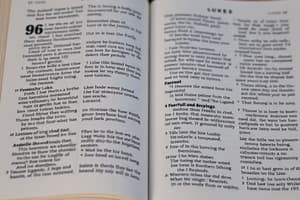Podcast
Questions and Answers
How many psalms are in the Book of Psalms?
How many psalms are in the Book of Psalms?
- 200
- 150 (correct)
- 100
- 50
Psalm 117 is the shortest psalm.
Psalm 117 is the shortest psalm.
True (A)
Psalm 119 is the longest psalm.
Psalm 119 is the longest psalm.
True (A)
What is the central verse of the Bible?
What is the central verse of the Bible?
The Book of Psalms is the ______ book of the Bible.
The Book of Psalms is the ______ book of the Bible.
What are the five key words that summarize the Book of Psalms?
What are the five key words that summarize the Book of Psalms?
Who was the first author of a psalm?
Who was the first author of a psalm?
Which psalm is authored by David?
Which psalm is authored by David?
Who was the third author of the psalms?
Who was the third author of the psalms?
Which author is known for overseeing the song service in the tabernacle?
Which author is known for overseeing the song service in the tabernacle?
What did Hezekiah praise God for in his psalms?
What did Hezekiah praise God for in his psalms?
Flashcards are hidden until you start studying
Study Notes
Overview of the Book of Psalms
- The Book of Psalms consists of 150 psalms, making it the longest book in the Bible.
- Psalms were written over approximately 1000 years, reflecting a broad historical context.
- Psalm 117 is the shortest psalm with only 2 verses, while Psalm 119 holds the record for the longest with 176 verses.
Central Position and Themes
- Psalm 118:8 is positioned as the center verse of the Bible, flanked by 594 chapters before and after it.
- The Book can be condensed into five key concepts: Praise, Prophecy, Pain, Petition, and Poetry.
Authorship
- Moses authored Psalm 90 around 1405 B.C. from Moab, reflecting on Israel's journey and God's fidelity to His people.
- David, a key figure in Israel's history, wrote 75 psalms around 975 B.C. in Jerusalem, focusing on worship, prophetic insights about the Messiah, and personal experiences.
- Solomon, known for his wisdom, authored Psalms 72 and 127 in 935 B.C., addressing his son Rehoboam and Israel concerning the significance of a righteous foundation and the glory of the Messiah’s reign.
- Asaph, chief musician, contributed 12 psalms, possibly around 740 B.C., emphasizing trust in God amidst adversity.
- Hezekiah, Judah's thirteenth king, wrote 10 psalms around 700 B.C. from Jerusalem, praising God for protection over His people and the city.
- Ethan, another musician, played a role as an author, adding depth to the collective expression found in the psalms.
Historical Context of David's Life in Psalms
- David’s psalms capture significant events such as:
- His time in Saul's court and eventually fleeing from Saul.
- Key moments like his struggles while hiding in caves and fleeing to achieve safety.
- His emotional responses to betrayal, sin, and the establishment of his kingdom.
- Reflects on major milestones like the return of the Ark of the Covenant and the coronation of Solomon.
Studying That Suits You
Use AI to generate personalized quizzes and flashcards to suit your learning preferences.




